Highlighting major news reports over the past 50 years, the ninth installment of our 10-part series begins in 2007. The September issue covered 2002-2006.
| 2007 was the year the Chommanard Book Prize was awarded for the first time. The award, which recognizes women with literary talent, is sponsored by the Bangkok Bank and Praphasarn Publishing House. Thailand Advanced Institute of Science and Technology-Tokyo Institute of Technology was established. With support from the National Science and Technology Development Agency (NSTDA), the Thai-Japanese project was designed to act as a focal point for academic research and collaboration among the NSTDA and partner universities, both domestic and abroad. 2007 also saw the birth of two airlines, both airlines folded in 2009 January • New Year’s Day began on a sad note as people learned that six bombs set in Bangkok and one in the adjacent province of Nonthaburi had exploded almost simultaneously at around 6.30pm on December 31. Two people were killed and 15 people were injured, including some foreigners. Police said it wasn’t clear who was responsible but ruled out southern separatists because of differences in bomb-making materials. March • The cabinet approved the signing of a free-trade agreement (FTA) with Japan March 27. Japan-Thailand Economic Civic organizations objected, charging that the military-installed government was exceeding its authority under the interim constitution by entering into the FTA. April • Japanese Prime Minister Shinzo Abe and visiting Thai Prime Minister Surayud Chulanont signed the controversial Japan-Thailand Economic Partnership Agreement on April 3 in Tokyo. • Siriraj Hospital in Bangkok announced that for the first time ever, conjoined twins with a shared heart and liver had been successfully separated. The 12-hour operation was actually performed in February, but the announcement was delayed until it was certain that the 10-month-old girls had a good chance of survival. Sixty-one doctors participated in the extremely complicated procedure. • Police said they expected the number of illegal North Korean immigrants crossing the Mekong River by speedboat into Thailand would reach about 1,000 by the end of the year, up from 40 in 2003. The North Koreans first fled into China and were then smuggled to Laos before entering Thailand. |
| • A Buddhist woman was set on fire as army chief General Sonthi Boonyaratkalin began an inspection tour of the deep South. The woman was shot as she rode her motorcycle to work and then set ablaze while she was still alive. Upon learning that General Sonthi was in the area, about 300 outraged relatives of the woman took her burned body to the Yala provincial hall. • After an eight-month courtship, Thai tennis champion Paradorn Srichaphan and Natalie Glebova, the Russian-born Canadian Miss Universe 2005, announced their engagement at a press conference. May • PM Surayud stood by a decision to sanction compulsory licensing of foreign medicines, despite backlash from Western countries and international pharmaceutical companies. June • The Aviation Department, reportedly acting on instructions from the International Civil Aviation Organization, instituted a ban on carrying liquids onboard planes departing from Thailand. Similar security measures had already been enacted in the United States and Europe. • Thai banks were instructed by the Asset Security Committee – an agency set up by the coup leadership to investigate corruption under the previous government to freeze more than 62 billion baht in bank accounts registered to ousted PM Thaksin, his wife and four other family members. • Female World Boxing Council light flyweight champion Siriporn Taweesuk, also known as ‘Black Rose’, was paroled from jail in Pathum Thani province after serving seven years of a ten-year sentence. The 24-year-old won the title in April in a match staged inside the prison compound. | July • A multi-use sporting facility called His Majesty the King’s 80th Birthday Anniversary 2007 Sports Complex was opened in Nakhon Ratchasima (Korat) province. The complex was built for the 2007 Southeast Asian Games, which coincided with His Majesty’s 80th birthday. • Anti-government protesters who gathered outside the residence of Privy Council President Prem Tinsulanonda on July 22 retreated after clashing for a third time with riot police. The United Front for Democracy Against Dictatorship (UDD) protesters called on Prem, a former army chief and prime minister, to resign from the Privy Council. They accused him of pulling the strings behind the September 2006 coup. On July 26, the Criminal Court ordered police to arrest nine UDD leaders so they could be charged with illegal assembly, resisting authorities and using force to harm them. August • A national referendum on the new constitution was organized by the Election Commission and held on August 19. The vote was 56.69% for approval of the draft charter and 41.37% against. Voter turnout was around 60%. King Bhumibol Adulyadej signed the constitution into law on August 24 and it came into force immediately. September • Thai-Nichi Institute of Technology, an industry-oriented private college, was established by the Technology Promotion Association (Thailand-Japan). The institute is located on Pattanakarn Road in Bangkok. December • The first general election since the Council for National Security seized power in September 2006 was held on December 23. A number of political parties contested 480 seats in the House of Representatives, with 241 needed for a majority. The People Power party led by Samak Sundaravej, a close ally of ousted PM Thaksin, won 233 seats; the Democrat Party won 165 seats; and Nation Party took 37 seats. After declaring victory, Samak invited other parties to join People Party in running the country. Five parties accepted and a six-party coalition with 315 seats was formed. |
2008 saw the opening of Bangkok Art and Culture Centre on Rama 1 Road and the founding of Bangkok Futsai Club. CentralPlaza shopping mall was opened on Chaeng Wattana Road in Nonthaburi. Business Air began operations at Suvarnabhumi Airport. In 2015 the carrier was rebranded as “Intira Airlines”. A snooker tournament known as Six-red World Championship, or SangSom 6 Red World Championship, was inaugurated in Bangkok. The matches are played with six red balls and six balls of other colors.
January
• The nation mourned the passing of Her Royal Highness Princess Galyani
Vadhana, who died at the age of 84 after a long battle with abdominal cancer. The Royal Household Bureau issued a statement announcing that the Princess died at Siriraj Hospital with King Adulyadej by his sister’s side. Shortly after the announcement, tens of thousands of mourners dressed in black gathered around the hospital to pay last respects.
• On January 28, People Power leader Samak Sundaravej was elected prime minister by a vote of 310 to 163 in Parliament.
He became the 25th Thai Prime Minister, serving until September 9, 2007.
February
• Former PM Thaksin returned to Thailand for the first time since his ouster. He was welcomed at Suvarnabhumi Airport by thousands of singing and dancing supporters. Thaksin prostrated himself upon arrival amid heavy security. About 500 police were deployed. “I want to stress that I don’t want to get involved in politics anymore,” said the former PM.
• Two sons of Interior Minister Chalerm Yubamrung, Wan and Duang, were again in the news. Wan was named assistant secretary to the public health minister and Duang was reinstated in the army. Wan had been arrested for assault, and Duang was discharged from the military in 2002 for his alleged role in the fatal shooting of a policeman at a Bangkok nightclub. Both sons were notorious for their allegedly hot tempers.
• PM Samak created a firestorm during an interview with Al Jazzera English when he downplayed his role in the massacre of students at Thammasat University in 1976, when he was interior minister. He denied any link to the crackdown and also insisted that only one student was killed. The official figure is 46 deaths, but many people maintain that the real number was in the hundreds.
January
• The nation mourned the passing of Her Royal Highness Princess Galyani
Vadhana, who died at the age of 84 after a long battle with abdominal cancer. The Royal Household Bureau issued a statement announcing that the Princess died at Siriraj Hospital with King Adulyadej by his sister’s side. Shortly after the announcement, tens of thousands of mourners dressed in black gathered around the hospital to pay last respects.
• On January 28, People Power leader Samak Sundaravej was elected prime minister by a vote of 310 to 163 in Parliament.
He became the 25th Thai Prime Minister, serving until September 9, 2007.
February
• Former PM Thaksin returned to Thailand for the first time since his ouster. He was welcomed at Suvarnabhumi Airport by thousands of singing and dancing supporters. Thaksin prostrated himself upon arrival amid heavy security. About 500 police were deployed. “I want to stress that I don’t want to get involved in politics anymore,” said the former PM.
• Two sons of Interior Minister Chalerm Yubamrung, Wan and Duang, were again in the news. Wan was named assistant secretary to the public health minister and Duang was reinstated in the army. Wan had been arrested for assault, and Duang was discharged from the military in 2002 for his alleged role in the fatal shooting of a policeman at a Bangkok nightclub. Both sons were notorious for their allegedly hot tempers.
• PM Samak created a firestorm during an interview with Al Jazzera English when he downplayed his role in the massacre of students at Thammasat University in 1976, when he was interior minister. He denied any link to the crackdown and also insisted that only one student was killed. The official figure is 46 deaths, but many people maintain that the real number was in the hundreds.
| March • Alleged Russian arms smuggler Viktor Bout was arrested in Bangkok in an undercover sting operation carried out by Thai police and undercover US Drug Enforcement Administration agents posing as FARC (Revolutionary Armed Forces of Colombia) guerrillas. The 41-year-old Bout, dubbed the “Merchant of Death,” was accused of selling weapons to FARC before the trap was sprung in a conference room at the Sofitel hotel on Silom Road. • Director-general of the Rice Department Prasert Kosalwit said Thailand, the world’s largest rice exporter, faced a potential rice shortage because sky-rocketing prices in the world market were encouraging traders to increase their export volume. “A shortage of rice in the local market is very likely, especially in light of shortages in neighboring countries,” said Prasert. • Senate elections were held on March 2 for the first time under the new constitution. Voter turnout was 56%. Seventy-six candidates vied for a place in the 150-seat Senate, one for each province. Under the new constitution the remaining 74 senators were to be appointed by a selection panel headed by the Constitutional President. April • Fifty-four migrant Burmese workers suffocated to death while being smuggled in a small seafood container from Song Island in Myanmar to Phuket. The ten-wheel truck carried a total of 121 workers. The driver of the truck escaped from the scene and the owner denied any involvement. The survivors were repatriated after being detained for illegal entry. • After 133 years the nation’s telegraphic service was terminated with a ceremony attended by thousands. The last message sent from the General Post Office, delivered to 40,000 select recipients, read: ‘The last chapter of 133 years of the Thai telegraph will be in the memory of Thais forever. |
| May • Drivers were banned from using mobile phones except those equipped for hands-free service. Police said on May 8 that violators would first be warned, and after May 20 fines between 400 and 1,000 baht would be given. June • The longstanding Thai-Cambodian border dispute heated up anew after the Cambodian government announced that it planned to propose the 11th century Preah Vihear Temple on the Thai-Cambodian border be declared a UNESCO World Heritage Site. Such a designation would effectively confirm the ancient temple was within Cambodian territory, a position rejected by Thai nationalists. The issue was a major point during a general Senate debate in which opposition senators attacked PM Samak and his government for supporting the Cambodian move. August • US President George W. Bush visited Thailand, in part to celebrate 175 years of bilateral relations between Thailand and the US. The US president also met with exiled Burmese dissidents and toured the Khlong Toey slum with Catholic priest Father Joe Maier. • Arrest warrants were issued for deposed PM Thaksin and his wife Potjaman after they jumped bail and left the country. The warrants were issued a few hours after Thaksin released a statement saying that he and his wife were in England and would not attend a scheduled court hearing. • On August 26 people from all over Thailand descended on Bangkok to join a massive protest against the government of PM Samak organized by the People’s Alliance for Democracy (PAD). Samak warned the protesters, numbering 100,000 according to some estimates, to abide by the law, but they invaded Government House, three government ministries and the headquarters of the National Broadcasting Service. No serious effort was made to remove the protesters from Government House although minor clashes between the police and protesters occurred. September • On September 2 violent clashes occurred between PAD and a pro-government UDD protesters, leaving one person dead and 43 injured. A state of emergency was declared in Bangkok. • On September 9, the Constitutional Court found PM Samak guilty of conflict of interest and disqualified him from holding the office of prime minister. The incident arose because Samak hosted two cooking shows on commercial TV stations. The nine judges were unanimous in their decision that Samak had violated Article 267 of the constitution, which states ministers may not accept payment from a private company while in office. • The Pheu Thai (For Thais) Party emerged as the third political party founded by former PM Thaksin on September 20, in anticipation of the dissolution of People’s Power Party (PPP). Sure enough, the Constitutional Court did dissolve PPP three months later. PPP was a replacement for Thaksin’s original Thai Rak Thai, which the Constitutional Court dissolved in May 2007 for violation of electoral laws. | • Thaksin’s brother-in-law Somchai Wongsawat was ratified by the National Assembly as the 26th Thai prime minister. His legitimacy was rejected by the PAD, who said he was Thaksin’s nominee. October • Bangkok’s eighth gubernatorial election was held on October 5, and won by incumbent Governor Apirak Kosayothin (Democrat Party). Apirak took 45.93% of the vote in an election contested by 16 candidates to win a second consecutive four-year term. • On October 6, PAD protesters rallied outside the Parliament building while it was in session. PM Somchai, who was seeking approval of his policies from the assembled legislators, was forced to climb over the fence to escape the rowdy scene, while many MPs remained stranded inside. Clashes between the protesters and police left two dead and 300 injured, including 20 policemen. Eventually police used teargas and the military was deployed to disperse the crowd. • The Supreme Court sentenced Thaksin to two years in jail over the Ratchadaphisek land purchase deal, convicting him of abuse power in helping his wife purchase the land at a low price. Potjaman was acquitted because she didn’t hold a political post. November • On November 25, PAD protesters blockaded Don Muang Airport, where the government had set up temporary offices, and also took over Suvarnabhumi Airport, leaving thousands of tourists stranded. The PAD was seeking the resignation of PM Somchai, who they called Thaksin’s proxy. Tourist Authority of Thailand Governor Siriporn Manoharn said the negative effects of the airport closures were greater than those of the tsunami that ravaged the country’s Andaman coastline on December 26, 2004. December • On December 2 the Constitutional Court found the ruling PPP guilty of fraud in the 2007 elections, ending Somchai’s term as prime minister and banning all PPP members from politics for five years. PAD leaders, satisfied with the ruling, ordered their supporters to leave Suvarnabhumi Airport. On the same day, Chaovarat Chanweerakul became acting prime minister. • In an election to fill the power vacuum left by PPP’s dissolution, Democrat Party leader, Abhisit Vejjajiva won a majority of votes over Pracha Promnok (Pracharai Party) in the House of Representatives on December 15 and became the 27th prime minister of Thailand. Abhisit received 235 votes to Pracha’s 198 and took his post officially on December 17. |
2009 saw the founding of Gift of Happiness Foundation charity under the Royal patronage of King Bhumibol Adulyadej. The foundation is dedicated to helping poor children in Bangkok and throughout Thailand. The Cabin Chiang Mai drug and alcohol rehabilitation facility was also founded. CentralFestival shopping mall opened in Pattaya. CentralPlaza opened shopping mall and entertainment complexes in Chonburi and Khon Kaen. The latter was the first Central Group mall to be opened in the Northeast. A private tropical botanical park known as Dokman Garden opened in Hang Dong district of Chiang Mai province. The inaugural Queens Cup Golf Tournament was held at the Santiburi Samui Country Club that year, and around 35 football clubs were founded.
PM Abhisit faced rising public discontent with his government and near-constant rumours of an imminent military coup. Pro-Abhisit academic Chirmsak Pinthong wrote a thought-provoking article in Naew Nah newspaper in which he said the nation was already in a state of civil war, although the slaughter had yet to begin.
January
• The ninth Bangkok gubernatorial election was held on January 11 after the resignation of Apirak Kosayothin on November 13, 2008. His resignation stemmed from an indictment by the National Counter Corruption Commission involving a 6.6 billion baht contract to procure fire-engines for the city. MR Sukhumbhand Paribatra (Democrat Party) was elected as the new governor.
• The government announced it had blocked more than 2,300 websites in 2008, the majority for allegedly offending the monarchy. The Democrat-led government promised to intensify efforts to clamp down on acts of lèse majesté, and appeared intent on widening its internet censorship capabilities. It allocated 45 million baht to set up a 24-hour center to police the internet, and introduced heavier fines and prison terms for anyone judged to have insulted the King online.
PM Abhisit faced rising public discontent with his government and near-constant rumours of an imminent military coup. Pro-Abhisit academic Chirmsak Pinthong wrote a thought-provoking article in Naew Nah newspaper in which he said the nation was already in a state of civil war, although the slaughter had yet to begin.
January
• The ninth Bangkok gubernatorial election was held on January 11 after the resignation of Apirak Kosayothin on November 13, 2008. His resignation stemmed from an indictment by the National Counter Corruption Commission involving a 6.6 billion baht contract to procure fire-engines for the city. MR Sukhumbhand Paribatra (Democrat Party) was elected as the new governor.
• The government announced it had blocked more than 2,300 websites in 2008, the majority for allegedly offending the monarchy. The Democrat-led government promised to intensify efforts to clamp down on acts of lèse majesté, and appeared intent on widening its internet censorship capabilities. It allocated 45 million baht to set up a 24-hour center to police the internet, and introduced heavier fines and prison terms for anyone judged to have insulted the King online.
| March • Lin Hui, a female panda on a ten-year loan from China to the Chiang Mai Zoo, gave birth to Lin Ping, a cub weighing 200 grams. Lin Hui was artificially inseminated after zoo officials tried for years to mate her with a male panda with no success. Lin Ping was an instant superstar, with month more than 14,000 people showing up at the zoo to see the baby panda over a three-day period following her birth. April • Protesters stormed the ASEAN summit held at Royal Cliff Hotel in Pattaya on April 11. Military helicopters whisked world leaders out of the hotel after anti-government red-shirt protesters forced their way through rows of armed soldiers stationed in front of the hotel. As the protesters occupied the hotel, PM Abhisit declared a state of emergency in Pattaya and in Chonburi. The summit was attended by leaders of the 10 ASEAN countries along with their counterparts from China, Australia, Japan, India, New Zealand and South Korea. • Armed soldiers and riot police were deployed throughout Bangkok when a state of emergency was declared on April 14 after-red shirt’ protesters blocked major roads and demanded the resignation of the government. In the early morning troops swept through hot spots firing weapons into the air to disperse the protesters. According to some accounts, two people were killed and more than 100 injured during clashes. Later in the morning the rally leaders told everyone to go home to prevent more bloodshed. Arrest warrants were issued for protest leaders. • PAD leader Sonthi Limthongkul survived an assassination attempt as he was being driven to his ASTV satellite television studios. Police said gunmen in pickup trucks ambushed Sonthi’s car and sprayed it with bullets from AK-47 and M-16 assault rifles, injuring him, his driver and an aide. May • The economy contracted by the largest percentage in a decade in the first quarter of 2009. Decreasing exports and sluggish domestic spending pushed Thailand into a recession. According to government numbers, GDP had shrunk 1.9% compared with the fourth quarter of 2008, and 7.1% year on. |
• On May 15 PM Abhisit presided over the ‘soft opening’ of the 2.2km extension of the BTS SkyTrain from Taksin Bridge across the Chao Phraya to Wong Wian Yai in Thonburi.
• The tourism industry continued to suffer the effects of the global economic downturn and domestic political turmoil. Visitor arrival numbers were down as much as 50% in the first four months of 2009 compared with the same period in 2008.
June
• PAD announced formation of the New Political Party (NPP). The party’s platform included the aim of ridding politics of corruption. NPP’s first leader was Somsak Kosaisuk, but it was expected that later on Sonthi Limthongkul would take the reins.
• The tourism industry continued to suffer the effects of the global economic downturn and domestic political turmoil. Visitor arrival numbers were down as much as 50% in the first four months of 2009 compared with the same period in 2008.
June
• PAD announced formation of the New Political Party (NPP). The party’s platform included the aim of ridding politics of corruption. NPP’s first leader was Somsak Kosaisuk, but it was expected that later on Sonthi Limthongkul would take the reins.
2010 is the year is the Football Association of Thailand organized the Thai League Cup (2nd era) competition for Thai football clubs. It was a good year for football, with close to 30 new clubs formed throughout the country. Gaggan Restaurant run by celebrated chef Gaggan Anand was established in Bangkok, serving progressive Indian cuisine. Kan Air airline based in Chiang Mai, Siam Air with its hub at Don Muang Airport, and Sunny Airways with its hub at Suvarnabhumi Airport were all founded. Of the three, only Siam Air is still in operation.
Flashfloods hit widespread areas of Thailand. Separate but related floods began in the Northeast and Central Thailand in early October due to abnormally late monsoon activity over the Bay of Bengal. The Chao Phraya overflowed its banks in many places and a tropical depression brought extremely heavy rainfall to the South and forced hundreds from their homes. Across the country the flood-related death toll was put at 232. Thai government figures revealed that floods affected nearly seven million people in more than 25,000 villages. The costs in terms of destruction of property and infrastructure were astronomic.
January
• Thailand Lacrosse Association (also known as TLA) was formed as the governing body of men’s and women’s lacrosse clubs in Thailand. The association was a joint effort from Prantarit Nerngchamnong, Naputt Assakul, and Pinyot Pibulsongram, three Thais who played lacrosse during their school days in America.
February
• Former PM Thaksin returned to Thailand for the first time since his ouster. He was welcomed at Suvarnabhumi Airport by thousands of singing and dancing supporters. Thaksin prostrated himself upon arrival amid heavy security. About 500 police were deployed. “I want to stress that I don’t want to get involved in politics anymore,” said the former PM.
• Two sons of Interior Minister Chalerm Yubamrung, Wan and Duang, were again in the news. Wan was named assistant secretary to the public health minister and Duang was reinstated in the army. Wan had been arrested for assault, and Duang was discharged from the military in 2002 for his alleged role in the fatal shooting of a policeman at a Bangkok nightclub. Both sons were notorious for their allegedly hot tempers.
• PM Samak created a firestorm during an interview with Al Jazzera English when he downplayed his role in the massacre of students at Thammasat University in 1976, when he was interior minister. He denied any link to the crackdown and also insisted that only one student was killed. The official figure is 46 deaths, but many people maintain that the real number was in the hundreds.
March
• Alleged Russian arms smuggler Viktor Bout was arrested in Bangkok in an undercover sting operation carried out by Thai police and undercover US Drug Enforcement Administration agents posing as FARC (Revolutionary Armed Forces of Colombia) guerrillas. The 41-year-old Bout, dubbed the “Merchant of Death,” was accused of selling weapons to FARC before the trap was sprung in a conference room at the Sofitel hotel on Silom Road.
• Director-general of the Rice Department Prasert Kosalwit said Thailand, the world’s largest rice exporter, faced a potential rice shortage because sky-rocketing prices in the world market were encouraging traders to increase their export volume. “A shortage of rice in the local market is very likely, especially in light of shortages in neighboring countries,” said Prasert.
• Senate elections were held on March 2 for the first time under the new constitution. Voter turnout was 56%. Seventy-six candidates vied for a place in the 150-seat Senate, one for each province. Under the new constitution the remaining 74 senators were to be appointed by a selection panel headed by the Constitutional President.
Flashfloods hit widespread areas of Thailand. Separate but related floods began in the Northeast and Central Thailand in early October due to abnormally late monsoon activity over the Bay of Bengal. The Chao Phraya overflowed its banks in many places and a tropical depression brought extremely heavy rainfall to the South and forced hundreds from their homes. Across the country the flood-related death toll was put at 232. Thai government figures revealed that floods affected nearly seven million people in more than 25,000 villages. The costs in terms of destruction of property and infrastructure were astronomic.
January
• Thailand Lacrosse Association (also known as TLA) was formed as the governing body of men’s and women’s lacrosse clubs in Thailand. The association was a joint effort from Prantarit Nerngchamnong, Naputt Assakul, and Pinyot Pibulsongram, three Thais who played lacrosse during their school days in America.
February
• Former PM Thaksin returned to Thailand for the first time since his ouster. He was welcomed at Suvarnabhumi Airport by thousands of singing and dancing supporters. Thaksin prostrated himself upon arrival amid heavy security. About 500 police were deployed. “I want to stress that I don’t want to get involved in politics anymore,” said the former PM.
• Two sons of Interior Minister Chalerm Yubamrung, Wan and Duang, were again in the news. Wan was named assistant secretary to the public health minister and Duang was reinstated in the army. Wan had been arrested for assault, and Duang was discharged from the military in 2002 for his alleged role in the fatal shooting of a policeman at a Bangkok nightclub. Both sons were notorious for their allegedly hot tempers.
• PM Samak created a firestorm during an interview with Al Jazzera English when he downplayed his role in the massacre of students at Thammasat University in 1976, when he was interior minister. He denied any link to the crackdown and also insisted that only one student was killed. The official figure is 46 deaths, but many people maintain that the real number was in the hundreds.
March
• Alleged Russian arms smuggler Viktor Bout was arrested in Bangkok in an undercover sting operation carried out by Thai police and undercover US Drug Enforcement Administration agents posing as FARC (Revolutionary Armed Forces of Colombia) guerrillas. The 41-year-old Bout, dubbed the “Merchant of Death,” was accused of selling weapons to FARC before the trap was sprung in a conference room at the Sofitel hotel on Silom Road.
• Director-general of the Rice Department Prasert Kosalwit said Thailand, the world’s largest rice exporter, faced a potential rice shortage because sky-rocketing prices in the world market were encouraging traders to increase their export volume. “A shortage of rice in the local market is very likely, especially in light of shortages in neighboring countries,” said Prasert.
• Senate elections were held on March 2 for the first time under the new constitution. Voter turnout was 56%. Seventy-six candidates vied for a place in the 150-seat Senate, one for each province. Under the new constitution the remaining 74 senators were to be appointed by a selection panel headed by the Constitutional President.
| April • Fifty-four migrant Burmese workers suffocated to death while being smuggled in a small seafood container from Song Island in Myanmar to Phuket. The ten-wheel truck carried a total of 121 workers. The driver of the truck escaped from the scene and the owner denied any involvement. The survivors were repatriated after being detained for illegal entry. • After 133 years the nation’s telegraphic service was terminated with a ceremony attended by thousands. The last message sent from the General Post Office, delivered to 40,000 select recipients, read: ‘The last chapter of 133 years of the Thai telegraph will be in the memory of Thais forever. May • Drivers were banned from using mobile phones except those equipped for hands-free service. Police said on May 8 that violators would first be warned, and after May 20 fines between 400 and 1,000 baht would be given. June • The longstanding Thai-Cambodian border dispute heated up anew after the Cambodian government announced that it planned to propose the 11th century Preah Vihear Temple on the Thai-Cambodian border be declared a UNESCO World Heritage Site. Such a designation would effectively confirm the ancient temple was within Cambodian territory, a position rejected by Thai nationalists. The issue was a major point during a general Senate debate in which opposition senators attacked PM Samak and his government for supporting the Cambodian move. August • US President George W. Bush visited Thailand, in part to celebrate 175 years of bilateral relations between Thailand and the US. The US president also met with exiled Burmese dissidents and toured the Khlong Toey slum with Catholic priest Father Joe Maier. • Arrest warrants were issued for deposed PM Thaksin and his wife Potjaman after they jumped bail and left the country. The warrants were issued a few hours after Thaksin released a statement saying that he and his wife were in England and would not attend a scheduled court hearing. • On August 26 people from all over Thailand descended on Bangkok to join a massive protest against the government of PM Samak organized by the People’s Alliance for Democracy (PAD). Samak warned the protesters, numbering 100,000 according to some estimates, to abide by the law, but they invaded Government House, three government ministries and the headquarters of the National Broadcasting Service. No serious effort was made to remove the protesters from Government House although minor clashes between the police and protesters occurred. September • On September 2 violent clashes occurred between PAD and a pro- government UDD protesters, leaving one person dead and 43 injured. A state of emergency was declared in Bangkok. | • On September 9, the Constitutional Court found PM Samak guilty of conflict of interest and disqualified him from holding the office of prime minister. The incident arose because Samak hosted two cooking shows on commercial TV stations. The nine judges were unanimous in their decision that Samak had violated Article 267 of the constitution, which states ministers may not accept payment from a private company while in office. • The Pheu Thai (For Thais) Party emerged as the third political party founded by former PM Thaksin on September 20, in anticipation of the dissolution of People’s Power Party (PPP). Sure enough, the Constitutional Court did dissolve PPP three months later. PPP was a replacement for Thaksin’s original Thai Rak Thai, which the Constitutional Court dissolved in May 2007 for violation of electoral laws. • Thaksin’s brother-in-law Somchai Wongsawat was ratified by the National Assembly as the 26th Thai prime minister. His legitimacy was rejected by the PAD, who said he was Thaksin’s nominee. October • Bangkok’s eighth gubernatorial election was held on October 5, and won by incumbent Governor Apirak Kosayothin (Democrat Party). Apirak took 45.93% of the vote in an election contested by 16 candidates to win a second consecutive four-year term. • On October 6, PAD protesters rallied outside the Parliament building while it was in session. PM Somchai, who was seeking approval of his policies from the assembled legislators, was forced to climb over the fence to escape the rowdy scene, while many MPs remained stranded inside. Clashes between the protesters and police left two dead and 300 injured, including 20 policemen. Eventually police used teargas and the military was deployed to disperse the crowd. • The Supreme Court sentenced Thaksin to two years in jail over the Ratchadaphisek land purchase deal, convicting him of abuse power in helping his wife purchase the land at a low price. Potjaman was acquitted because she didn’t hold a political post. November • On November 25, PAD protesters blockaded Don Muang Airport, where the government had set up temporary offices, and also took over Suvarnabhumi Airport, leaving thousands of tourists stranded. The PAD was seeking the resignation of PM Somchai, who they called Thaksin’s proxy. Tourist Authority of Thailand Governor Siriporn Manoharn said the negative effects of the airport closures were greater than those of the tsunami that ravaged the country’s Andaman coastline on December 26, 2004. December • On December 2 the Constitutional Court found the ruling PPP guilty of fraud in the 2007 elections, ending Somchai’s term as prime minister and banning all PPP members from politics for five years. PAD leaders, satisfied with the ruling, ordered their supporters to leave Suvarnabhumi Airport. On the same day, Chaovarat Chanweerakul became acting prime minister. • In an election to fill the power vacuum left by PPP’s dissolution, Democrat Party leader, Abhisit Vejjajiva won a majority of votes over Pracha Promnok (Pracharai Party) in the House of Representatives on December 15 and became the 27th prime minister of Thailand. Abhisit received 235 votes to Pracha’s 198 and took his post officially on December 17. |
2011 saw the opening of CentralPlaza Chiang Rai, Central Plaza Grand Rama IX in Bangkok and CentralPlaza in Phitsanulok town. The 24-hour music and entertainment channel known as VERY TV began broadcasting. Terminal 21 shopping mall opened on Sukhumvit Road near Asoke intersection in Bangkok. City Airways and Thai Regional Airlines came on the scene but both carriers have since gone out of business. Thai Airways subsidiary Thai Smile Air also was founded and is still flying out of Suvarnabhumi Airport.
Catastrophic floods began at the end of July and spread through North, Northeast and Central Thailand along the Mekong and Chao Phraya river basins. In October floodwaters inundated parts of Bangkok. The floods resulted in a total of 815 deaths and affected 13.6 million people. Of 76 Thai provinces, 65 were declared flood disaster zones, and over 20,000 square km of farmland was damaged. Thailand’s southern provinces also saw seasonal flash-flooding towards the end of the year, although not nearly as destructive as the floods in other areas.
January
• Tensions rose as Cambodia charged two Thai citizens with spying after they were arrested for illegally crossing the disputed border.
February
• After an exchange of fire across the Thai-Cambodian border, the two countries agreed to allow Indonesian monitors access to the area to prevent further clashes.
April
• Eighteen people were left dead following armed clashes near the ancient Preah Vihear temple along the Thai-Cambodian border.
May
• On May 9 the lower chamber of Parliament was dissolved, paving the way for new elections. Yingluck Shinawatra, younger sister of Thaksin, jumped into the race as a candidate to unseat Abhisit.
July
• A general election for 500 seats in the 24th House of Representatives was held on July 3. Pro-Thaksin Pheu Thai Party took 75% of the votes to win 265 seats, giving it a clear majority. The Democrat Party came in second with 159 seats and Bhumjathai Party followed with 34 seats. Abhisit conceded and congratulated Yingluck as “Thailand’s first female prime minister.”
Catastrophic floods began at the end of July and spread through North, Northeast and Central Thailand along the Mekong and Chao Phraya river basins. In October floodwaters inundated parts of Bangkok. The floods resulted in a total of 815 deaths and affected 13.6 million people. Of 76 Thai provinces, 65 were declared flood disaster zones, and over 20,000 square km of farmland was damaged. Thailand’s southern provinces also saw seasonal flash-flooding towards the end of the year, although not nearly as destructive as the floods in other areas.
January
• Tensions rose as Cambodia charged two Thai citizens with spying after they were arrested for illegally crossing the disputed border.
February
• After an exchange of fire across the Thai-Cambodian border, the two countries agreed to allow Indonesian monitors access to the area to prevent further clashes.
April
• Eighteen people were left dead following armed clashes near the ancient Preah Vihear temple along the Thai-Cambodian border.
May
• On May 9 the lower chamber of Parliament was dissolved, paving the way for new elections. Yingluck Shinawatra, younger sister of Thaksin, jumped into the race as a candidate to unseat Abhisit.
July
• A general election for 500 seats in the 24th House of Representatives was held on July 3. Pro-Thaksin Pheu Thai Party took 75% of the votes to win 265 seats, giving it a clear majority. The Democrat Party came in second with 159 seats and Bhumjathai Party followed with 34 seats. Abhisit conceded and congratulated Yingluck as “Thailand’s first female prime minister.”
| August • Yingluck was appointed as the 28th Thai prime minister, effective August 5. She held the position until May 7, 2014, when she was ousted in a military coup. September • The Hong Kong-based Asia Internet Coalition said of Thailand’s Computer Crimes Law: “By holding an intermediary liable for the actions of its users, this case could set a dangerous precedent and have a significant long-term impact on Thailand’s economy. Changing the way the Internet works in Thailand by denying intermediaries the protections they are granted in most countries around the world could have a significant detrimental impact.’’ October • The government introduced a rice subsidy scheme with the aim of ensuring that farmers received a guaranteed price for their rice crop. Critics said the scheme caused government debt to soar, and the resulting increase in the price of Thai rice caused the country to lose its rank as the world’s number one rice exporter. |
November
• Flooding around Ayutthaya’s Bang Pa-In Industrial Estate forced some big manufacturing plants to shut down, including Western Digital plant, a major producer of hard drives for the global market.
• Ousted former PM Thaksin asked the Thai government to withdraw a plan to seek a royal pardon for him as he was worried that it would make the situation worse for his sister Yingluck’s government.
• Information and Communication Technology Minister Anudith Nakornthap said on November 24 that local Facebook users risked violating the Computer Crimes Act unknowingly by pressing the “like” or “share” button in response to comments posted with anti-monarchy messages. Anyone doing so could be arrested on charges of violating the Computer Crime Act and committing lèse majesté because the law prohibits the dissemination of content deemed insulting to the monarchy.
December
• Foreign minister Surapong Tovichakchaikul said a new travel document for Thaksin could be a “New Year’s present”. The former PM was reportedly spending most of his time in Dubai after being handed a two-year jail term in absentia for corruption. The opposition Democrat Party said it was unsurprised by the move and dismissed the foreign minister as an inexperienced non-entity, whose appointment was aimed solely at facilitating the ousted prime minister’s return.· Police chief Priewpan Damapong said that about 500 border patrol police would be deployed in Bangkok to help metropolitan police combat crime, which was expected to rise with the receding of floodwaters and the release of about 30,000 prisoners who had received a royal pardon.
• Flooding around Ayutthaya’s Bang Pa-In Industrial Estate forced some big manufacturing plants to shut down, including Western Digital plant, a major producer of hard drives for the global market.
• Ousted former PM Thaksin asked the Thai government to withdraw a plan to seek a royal pardon for him as he was worried that it would make the situation worse for his sister Yingluck’s government.
• Information and Communication Technology Minister Anudith Nakornthap said on November 24 that local Facebook users risked violating the Computer Crimes Act unknowingly by pressing the “like” or “share” button in response to comments posted with anti-monarchy messages. Anyone doing so could be arrested on charges of violating the Computer Crime Act and committing lèse majesté because the law prohibits the dissemination of content deemed insulting to the monarchy.
December
• Foreign minister Surapong Tovichakchaikul said a new travel document for Thaksin could be a “New Year’s present”. The former PM was reportedly spending most of his time in Dubai after being handed a two-year jail term in absentia for corruption. The opposition Democrat Party said it was unsurprised by the move and dismissed the foreign minister as an inexperienced non-entity, whose appointment was aimed solely at facilitating the ousted prime minister’s return.· Police chief Priewpan Damapong said that about 500 border patrol police would be deployed in Bangkok to help metropolitan police combat crime, which was expected to rise with the receding of floodwaters and the release of about 30,000 prisoners who had received a royal pardon.
*Sources for this story include archives of the Bangkok Post, The Nation and Wikipedia.

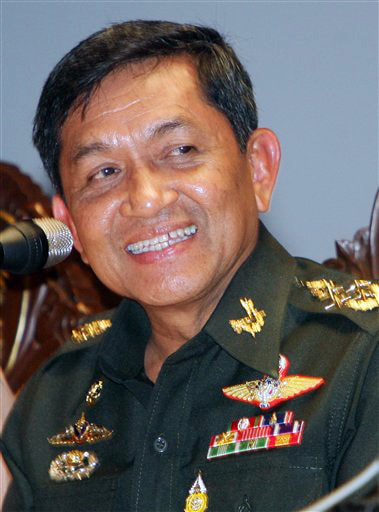
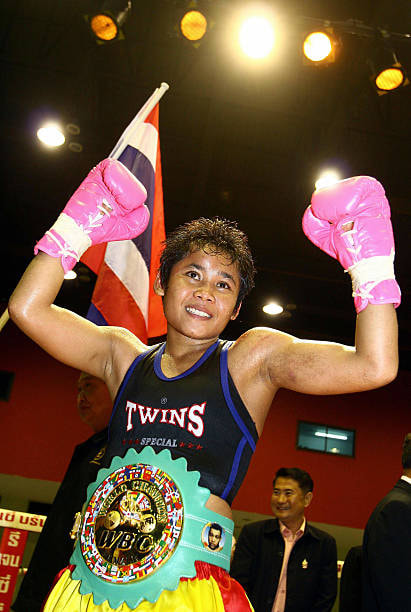
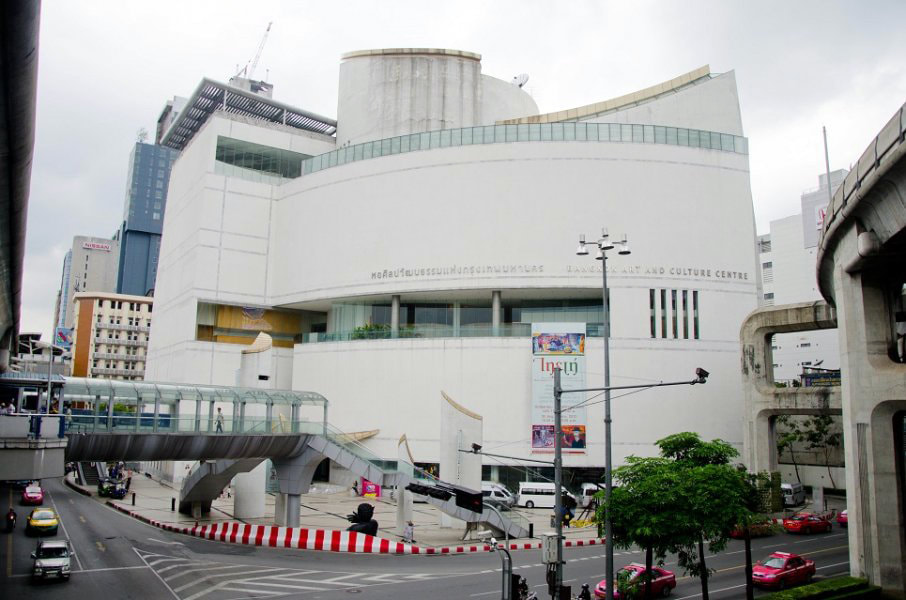
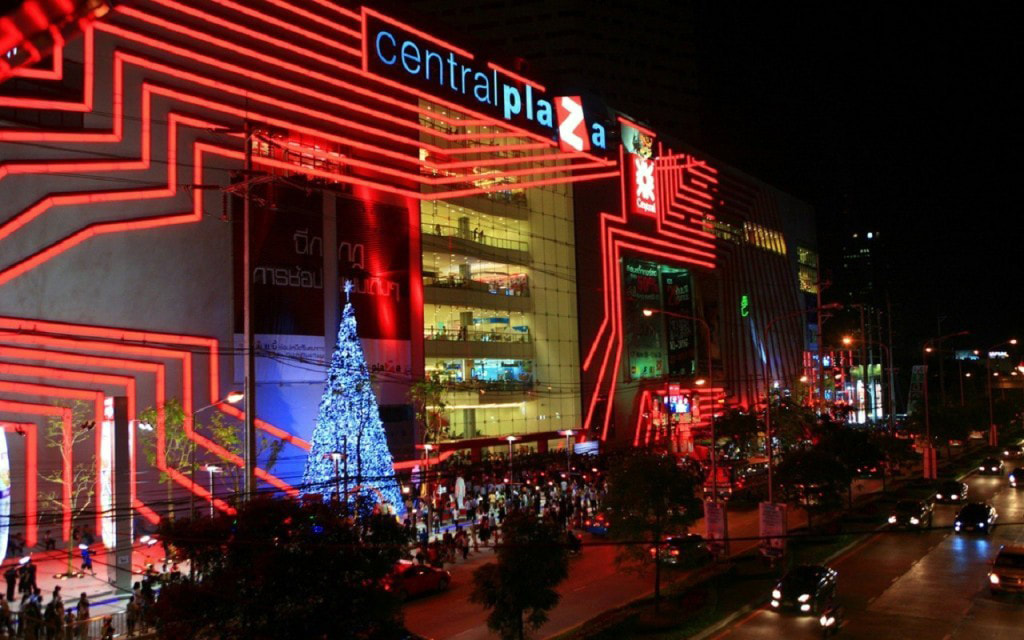
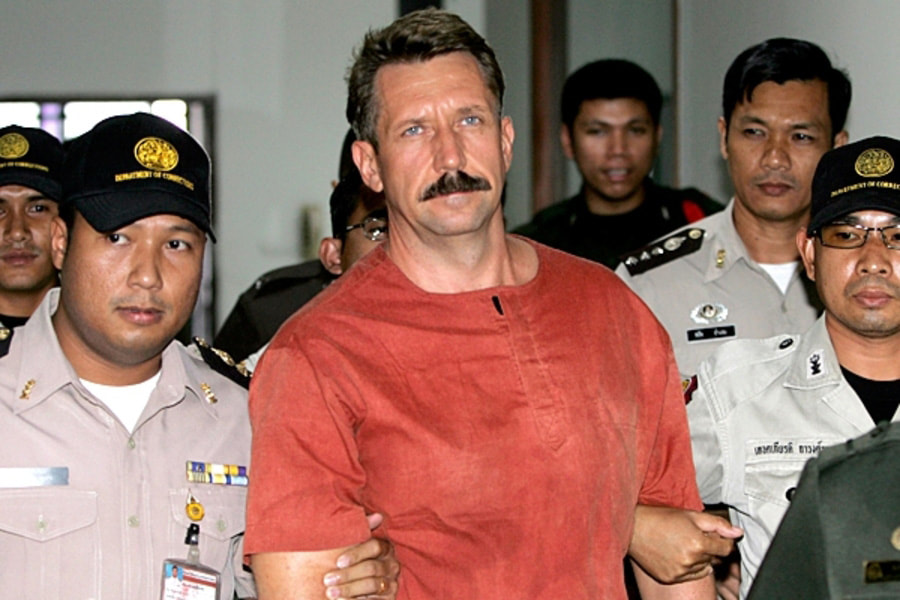
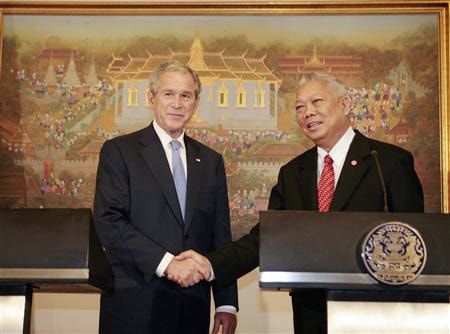

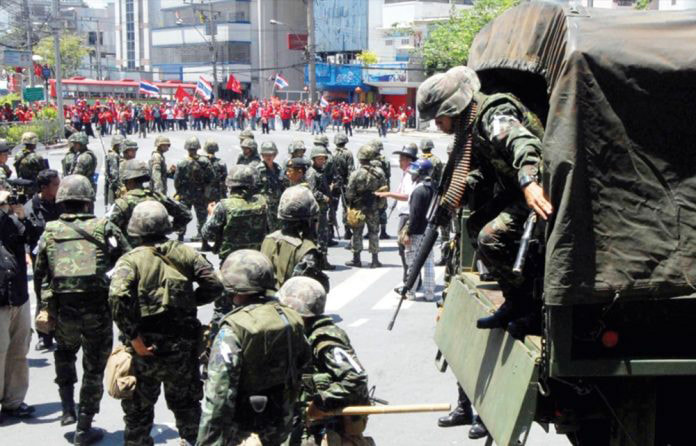
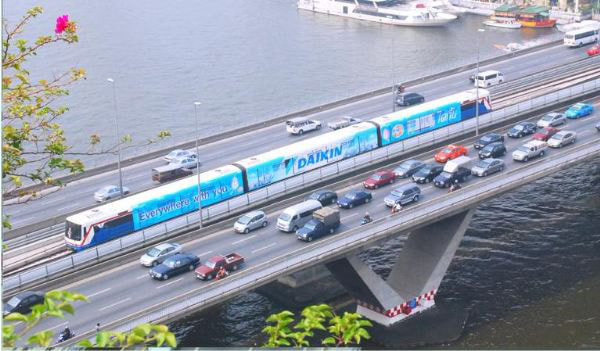
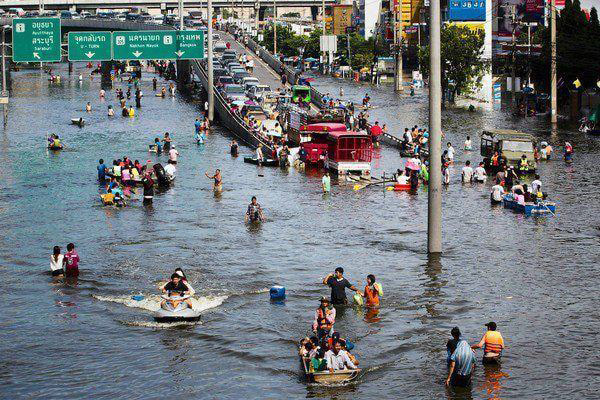
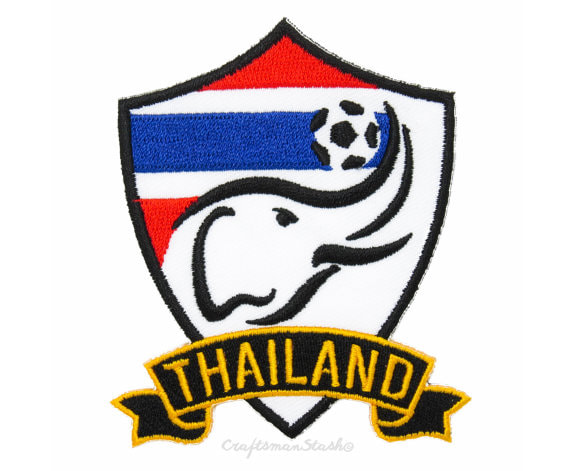
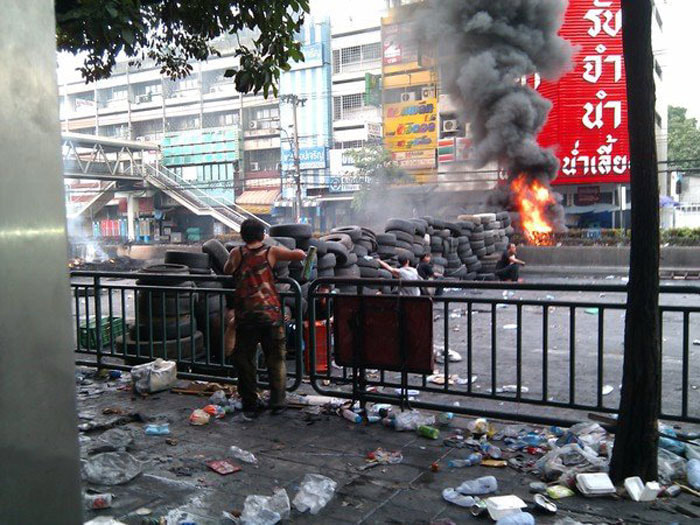
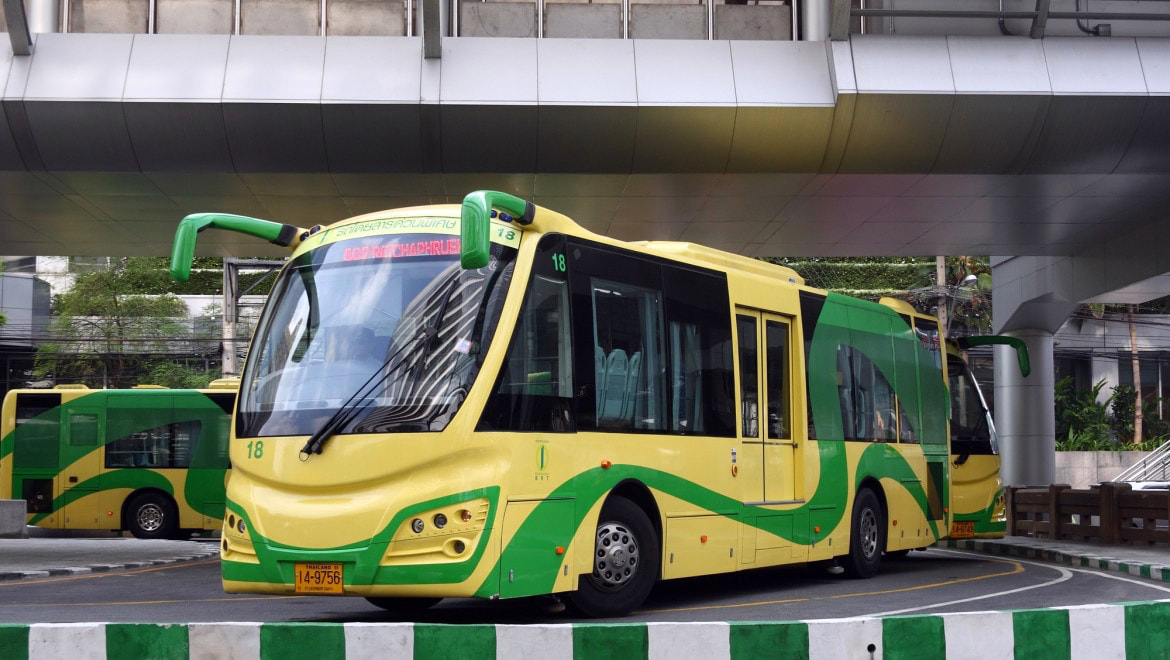
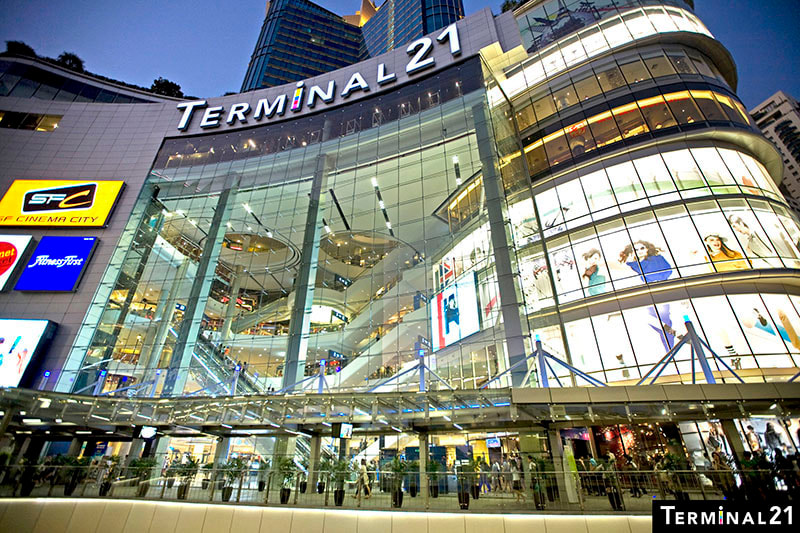
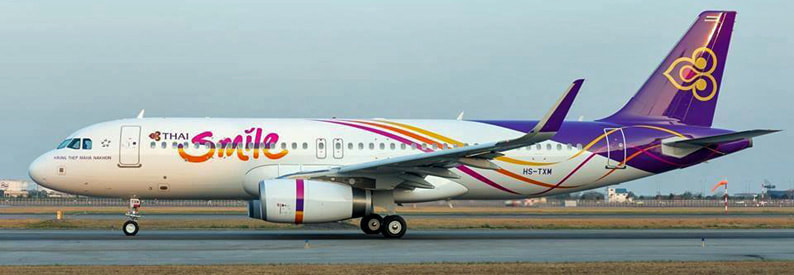
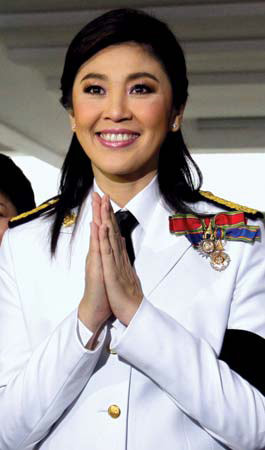
 RSS Feed
RSS Feed
















